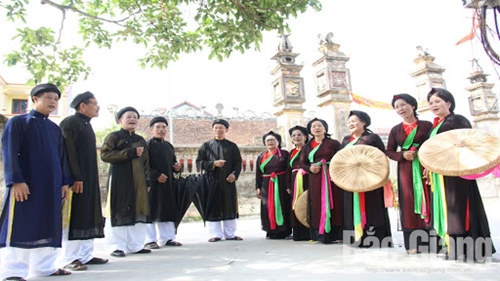February 14, 2021 | 20:18 (GMT+7)
How Quan Ho folk singing preserves in Bac Giang
PANO - People often hear about "Quan ho Bac Ninh", the love duet folk singing which was recognised as the Intangible Cultural Heritage by the United Nations Educational, Scientific and Cultural Organization (UNESCO) in 2009. However, Quan ho is not only popular in Bac Ninh but also popular in Bac Giang as well.
Bac Ninh and Bac Giang are separated by the Cau River, in northern Vietnam. However, many of the villages in these two provinces are twinned, reinforcing their relationship through social customs such as Quan ho folk songs.
If Quan ho Bac Ninh is familiar, then Quan ho Bac Giang is still not known by many people. In Bac Giang, there are many old artisans who still love Quan ho singing. A series of U70 - U90 Quan ho singing clubs have been very active in Trung Dong village (Van Trung commune), Dinh Ca village (Quang Minh commune) or Tam Tang village (Quang Chau commune). Despite their old age, those artisans still memorize hundreds of ancient Quan ho folk songs. Without beat, they still show the soul of Quan ho while singing, especially people’s emotional states of longing and sadness upon separation, and the happiness of the meeting of lovers.
    |
 |
|
A Quan ho folk singing club in Bac Giang (photo: Baobacgiang) |
Moreover, those artisans also voluntarily pass on this precious ethnic culture to the next generations. The famous Quan ho singing couple of Phu Hiep - Dang Nam (Tho Ha village) is one of the singers grew up by those clubs. In 2012, on the occasion of the 40th anniversary of UNESCO, Phu Hiep and Dang Nam became representatives of Vietnam to perform Quan ho folk singing in Paris.
It is known that Bac Giang province has organized and launched many programs to preserve their traditional Quan ho singing, such as a contest to collect and perform ancient Quan ho folk songs, organizing free Quan ho singing classes or building Quan ho cultural houses. The Quan Ho singing movement has spread widely in almost all villages in the province. They sing Quan ho folk songs at rituals, festivals, competitions and informal gatherings.
One of the highlights in Quan ho singing conservation in Bac Giang is the Quan Ho Singing Festival, which has been maintained for decades at the Bon Da festival. This festival has contributed to the implementation of commitments of Vietnam in general and Bac Giang province in particular with UNESCO in the conservation and promotion of effective Quan ho folk songs.
Translated by Hoang Linh